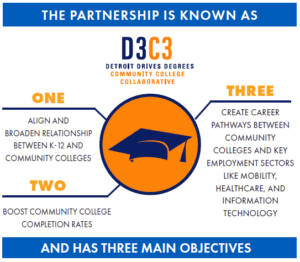Apply the old adage, “There’s strength in numbers” to Southeast Michigan’s Macomb, Oakland, Wayne counties, and it’s easy to see why the more than 65,000 students represented by the tri-county community colleges are so meaningful in the state’s efforts to boost collegiate graduation rates.
That is why the Detroit Regional Chamber’s Detroit Drives Degrees Community College Collaborative (D3C3), a newly launched partnership with two key foundations and seven area community colleges, has such potential. This effort will not only change student lives, but will improve the economic future for everyone who calls this area home, said Greg Handel, the chamber’s vice president of talent and education.
“This will ensure they’re aligned with demand and have the content to prepare people not just in theory but in practice to succeed,” Handel said.
Partnerships Key to Reaching 60% Attainment by 2030
The community college partners are Henry Ford College, Macomb Community College, Monroe County Community College, Oakland Community College, Schoolcraft College, Washtenaw Community College and Wayne County Community College District.
D3C3’s two foundation partners — the Ballmer Group and the Ralph C. Wilson Jr. Foundation — have pledged to more than $20 million in initial funding to get the ball rolling. Planning has been fast and furious ever since the foundations’ support was first announced at the 2022 Mackinac Policy Conference, according to Handel.
 “Ultimately, what we’re trying to do with is to harness state policy and investment in a way that sustains and scales these investments and improves outcomes,” Handel said.
“Ultimately, what we’re trying to do with is to harness state policy and investment in a way that sustains and scales these investments and improves outcomes,” Handel said.
The Chamber’s Detroit Drives Degrees has the overarching goal of increasing the region’s postsecondary attainment rate to 60% and cut the racial equity educational attainment gap by half. The state and Chamber want to hit that goal statewide by 2030, which requires programs like D3C3 to be successful.
‘A Game-Changer’ for our Economy
For Dave Egner, president and chief executive officer of the Ralph C. Wilson Jr. Foundation, community colleges are a win-win partner. Community colleges educate more than 50% of all college students in the United States, Egner said, and they are the first stop before transferring to a four-year institution or the place to earn a two-year associate degree.
“While the number of certificate and credential programs offered has grown significantly in recent years, there is a tremendous opportunity through D3C3 to better ensure that job-focused education and training is designed and continually updated to meet the region’s labor market demand, in close partnership with local employers,” Egner said. “This type of regional collaboration can be a game- changer for our economy and lead to better career paths for adults and young adults looking for a highquality and good-paying job.”
Kayla Roney Smith, portfolio manager for the Ballmer Group Southeast Michigan, agreed. She said the Ballmer Group is excited to partner with the Ralph C. Wilson Jr. Foundation, the Chamber, and community colleges through D3C3.
“In Southeast Michigan, community colleges are critical to building smoother pathways from education to quality careers, given their close engagement with K-12 schools, local employers, and four-year university partners,” Roney Smith said. “If D3C3 is successful, we will see more students – especially those facing additional barriers to opportunity – graduating from college and starting in family-sustaining careers right here in Southeast Michigan.”

